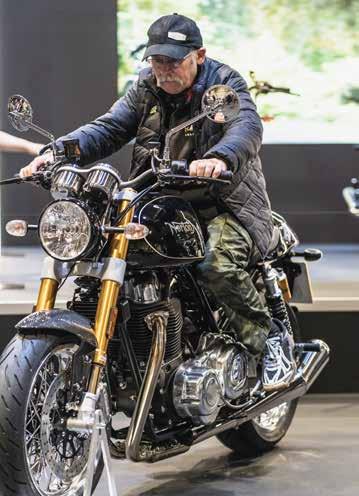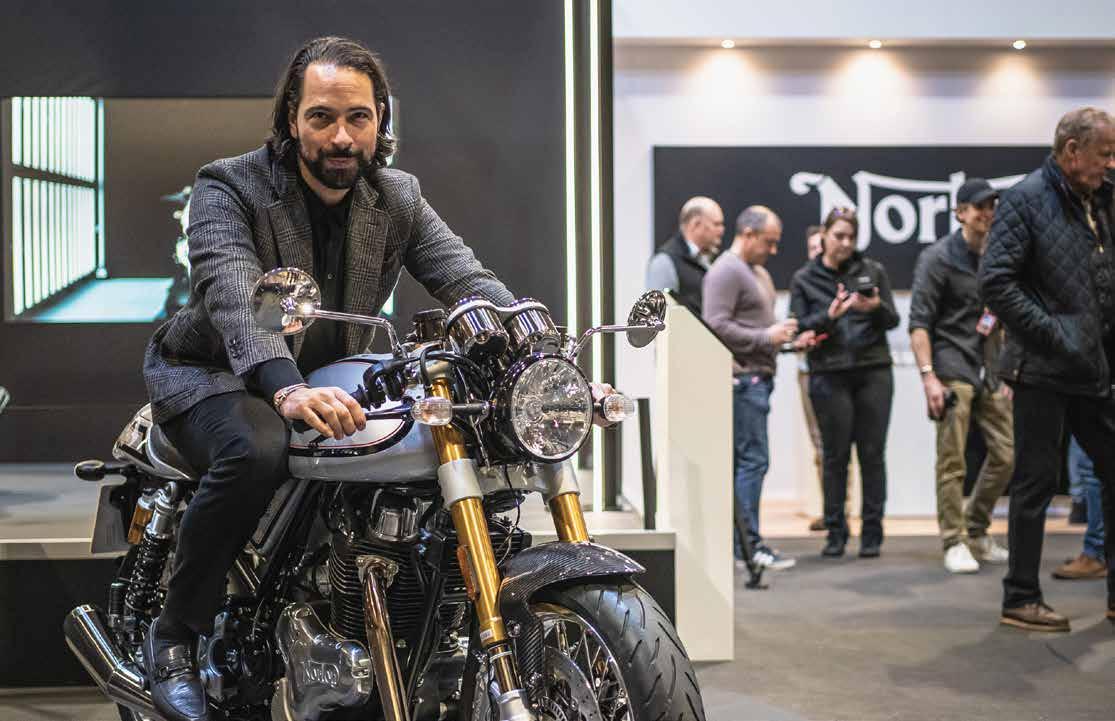
15 minute read
TVS touch for Norton
Christian Gladwell, Norton’s chief commercial officer, checks out the recently relaunched Commando
Through new eyes
Head-hunted from outside the industry, Norton’s new chief commercial officer, Christian Gladwell, has radical plans for the ongoing relaunch of the historic brand. He caught up with Alan Dowds at Motorcycle Live to discuss them
It’s an interesting counterfactual to consider, but what if John Bloor, in the late 1980s, had set his sights on buying the Norton marque rather than Triumph? We might now be seeing a slew of big-bore parallel twins powering a range of adventure bikes, with a Britishbuilt 850cc twin running in Moto2, and a V4 superbike winning at the Isle of Man, WSBK and BSB – all with the Norton badge on the tank. Meanwhile, fans of the old Meriden Triumph brand would be gnashing their teeth and wailing at yet another false dawn as the latest smallscale firm to own the Bonneville motorcycle trademark went under once again.
As we all know, John Bloor didn’t buy Norton though. And the real history of British bike brand ‘N’ since the 1980s has been complicated – it has certainly lived in interesting times, as the apocryphal Chinese curse goes.
But now, the times look to be a bit more ‘interesting’ in a positive sense, with massive investment from the new owner, Indian giant TVS. A new senior management team has replaced the previous disgraced regime. There’s a shiny new bespoke factory that’s just been built in Birmingham. And while there’s not a lot in terms of fresh metal on show just yet, it seems only a matter of time before a few more Norton’s are launched.
I spoke to one of those new senior managers, Christian Gladwell, on the firm’s stand at the NEC show. He’s every bit as charming and immaculately turned out as you’d expect from a chief commercial officer at a large bike brand. But there’s also the hint of something very different, which is underlined when we speak about his pathway to this job. “It’s an unusual journey, and I don’t come from an automotive background or a motorcycle background. I come from a luxury, marketing, customer experience, and branding background. So I’ve been involved in things like setting up Bulgari hotels, Burberry’s digital transformation, and Breitling. I did a lot of work with LVMH Chanel, Gucci, Sergio Rossi and Valentino (the fashion brand, not Rossi!). I also have the dubious honour of having launched Jay-Z’s cologne…”
Rather than working his way up from the press fleet workshop or parachuting in from a job at a car importer, Gladwell has come via the Scots Guards and Saatchi. And it’s fair to say that his ideas (and, you have to assume, the views of TVS) of what Norton should be are just as unusual, especially compared to the mainstream motorbike world.
That starts with the very ethos of the brand. Gladwell speaks enthusiastically about a vision for so-called ‘modern luxury’ and a modernist approach to design. “Modern luxury is very much misunderstood. People think you’re going to charge a lot of money for stuff with some writing on it, and really, it’s not about that. It’s about constructing a range of products which lifts the soul, and really makes people feel a certain way, and that’s people who design, people who make, people who buy, people who covet it and want to buy it. There has to be a story around it, and if you look at one of the reasons why I am at Norton, I thought there was a real opportunity to draw on the past without being completely constrained by it.”
What about this ‘modernist’ mindset? “When we talk about modern luxury, for us, it
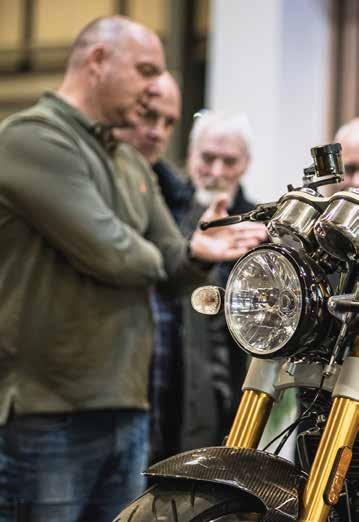
actually means an intellectual understanding of modernity and modernism. So we don’t mean ‘new’. We mean modernist in the same way as Piet Mondrian was a modernist painter. Imagine that all you’ve ever seen is Vermeers, Gauguins and Van Goghs, and then suddenly you’ve got Composition Number III in Blue, Yellow and Red! The Citroën SM is my favourite car of all time, and it still looks modern today, it still looks new, you don’t know when it was made. So, when we look at our sales partners, our retail partners, and we say that we want modernity expressed in our physical spaces, that’s what we mean. We want people to walk in and go, ‘Wow! This is amazing’.”
But what about the mundane practicalities of a motorcycle business in the UK? How does Gladwell see Norton’s distribution evolving? “We are working through a third-party sales partner strategy at the moment, so it is our ambition to work with the trade. We’re not calling them dealers; they are sales partners. We are looking to work with people who understand customer service and the focus on customer-centricity. If you look at the background I have in retail luxury, you know that’s what I would expect our corporate identity, stores and retail spaces to look like.
We will have our own very limited – I’m talking one or two – stores that we’ll sell directly out of. But yes, we will lean on a few super high-end partners – and by high-end, I don’t mean expensive. I mean people who understand customer service. They are existing motorcycle dealers, and we’re going through a selection process. We are setting the criteria at the moment. We’re calling these guys partners because we want partners for the long-term, and we want to build sustainable businesses with them.”
But Gladwell is pretty scathing about the current retail model in both automotive and bikes. “We are looking to revolutionise the retail experience. I don’t come from an automotive background. Still, if you were setting up the automotive industry now, knowing what you know about how important customer relationships are, there is no way you would set up the way they do it. What, you’re going to give the customer away to a third party? Historically they did that because OEMs were full of engineers who didn’t want to speak to human beings…
“Take, for example, a business I worked with, Bulgari. If you walked into the boardroom at Bulgari and said, ‘I’m going to set up a wholesale model, and all of our stores are now going to be on the outskirts of regional cities. I mean, it’s nonsense. Look directly at the retail experience in cars – I’m painting with very broad-brush strokes. I’m not mentioning names, but historically, the way you buy a car, even a luxury car that you’re going to spend, say, £85,000 on, is you take time out on a Sunday morning and drive to the outskirts of a retail estate. You drink terrible coffee and have someone try to upsell you on the accessories pack. That is not the customer experience I recognise in any way, shape or form. So we are looking to evolve that in a much more customercentric, a much more empathetic way, albeit while saying, look, this is a luxury brand. We know what we’re doing in terms of the creative direction and the duration of this brand, but we are going to put you at the centre of it.
“The world is changing, but equally, we want to work with partners. Honestly, if my shareholders gave me a blank cheque and ten years, I’d probably own the entire point of sale, but that’s not the case, so there’s going to be some form of partnership. I want the best in the business, and I want them incentivised in the best way to provide the best retail experience.”
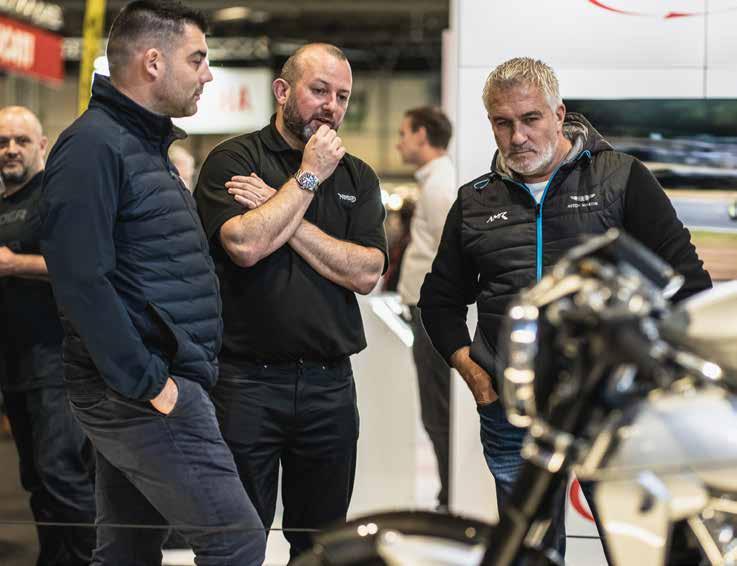
Fine words – and an impressively ambitious vision for sure. But again, we go back to practicalities. With this new model of a retail network, how would things like servicing and spares support work? Currently, the plan is for the factory to run the servicing, taking bikes back to the HQ for work. “Yes, we’ll come and pick it up. A Norton van will collect your bike and bring it back to you. We realise that’s unsustainable and not massively costeffective, but various other brands have done it. In the medium term, what I’d like to do is servicing in vans. It isn’t easy to do mobile servicing with the V4 platform because it’s a complex engine, but on a £44,000 motorcycle, yeah of course we come and pick it up and take it away. With the Commandos, it’s a bit more straightforward. I’d like a Norton branded Sprinter van to turn up at the customer’s convenience with service at your property or your work wherever, and you’re good to go.”
What about spares support? “We’ve got good parts availability for the Commando, more challenging parts availability for the SV. But we still offer it. It’s the supply chain, the same thing that’s biting everyone. We’ve actually got two engineers on the ground in Taiwan, and we’ve got two engineers on the ground in South Africa who just literally moved there so that we can guarantee spares volumes. For Öhlins and Brembo, those guys are the easy bit. Those guys are fine. But when you’re handmaking carbon fibre tanks from one supplier in South Africa, you know you’ve got to send your guys out there to ensure that there is quality.”
Where would Gladwell position Norton in the UK market, ideally? “The challenge is, if you want 20% market share, then your retail network sort of wags the dog because it’s all about the volume, but it’s not about volume with us. Now we do want a sustainable business, and we want to sell more than 8000 motorcycles a year. It’s a sustainable business, but equally, I am not looking at saying to my partner network, ‘I need 15% market share. I need the top 5%, and we’re going to offer something that the top 5% really want, and we are able to deliver given the scale of our business and given the scale of manufacturing capability and the scale of the investment.
“We are never going to be Honda, and we don’t want to be Honda, and that’s nothing against Honda. They do things brilliantly, but we don’t want to sell that kind of volume, neither are we Brough Superior: we’re not 1000 bikes a year. We want to be in the middle, you know, peak production for us looks like 40,000 motorcycles a year in six or seven years – which is a decent business, right? I mean, it’s not Ducati; it’s two-thirds of Ducati in terms of volume, and it wouldn’t be a product range exactly like Ducati. They ➔
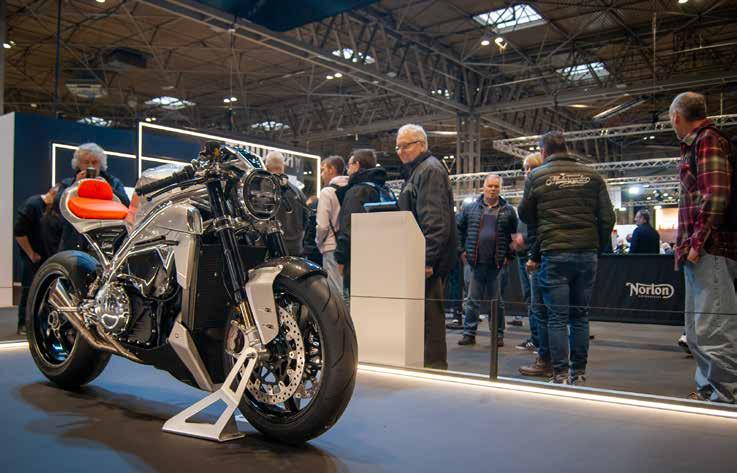
have a lot of different products. Obviously, we will have a much broader product range than we have at the moment, and up to 50% of that may be electric.”
What is Gladwell riding himself at the moment? “I’ve got an MV Agusta Turismo Veloce Lusso, and it’s a great bike, wonderful quick shifter, best on the market for me. I have a Norton, and I also have my name down for a Commando, but if I want a bike that I can blast around, and I can put my wife on the back of, it’s the Agusta.
“If you looked at me through the marketing lens, I am a dyed-in-the-wool Ducati Multistrada customer, 100%. But I’d rather walk. Not because the bike’s not great. It’s a great bike, but because it’s unbelievably obvious. It’s the motorcycle equivalent of a dozen red roses for your wife; ‘I’ve never had a creative thought in my mind in my life but I’ve been told I have to buy this’. Ducati does a wonderful thing, and the brand equity is entirely built around racing and MotoGP. They do a wonderful job. They’re incredibly successful, but it’s not what we want to do with Norton. We’re not in the business of aping other people’s business model. They do a great thing, but it’s not for us.”
What is Norton planning in terms of product development, then? Will the prototype Atlas 650 twin ever see the light of day, or has it been completely cancelled? “Look, it’s a tough decision to make. In a perfect world, we would do everything, but we’ve only got a certain amount of resources. We need to focus on what’s doable and not let people down by saying yeah, we’re going to do all of this and then deliver something at 60%.
“If the question is ‘are there plans in the future for a fully homologated twin scrambler and derivatives?’ then yes, for sure, but we’ve made a decision. We had a number of people that put down deposits on the Atlas, and we made the difficult call of actually fronting up and saying look, we’re not going to make that in the foreseeable future, but if you want to switch to a Commando, we will honour the deposit. When you’re fair and reasonable and when you communicate like that, the vast majority of people understand. Of course, you get people saying you said you were going to make an Atlas – well, okay, we never said that it was other people who owned the company. We’ve actually come out and said we appreciate you want this, but we are not in the market of making a parallel twin 650 super light at £12k. We understand it’s going to disappoint some people, but we just have to be honest.
“Of course, our product range is going to get bigger. So, think about families; we’ve invested in the V4, and of course, there’s going to be a V4 family. At the moment, we’ve got two there’s going to be more. Without going into specifics, there are going to be more versions of the V4 family that are homologated for the largest markets in the world around 2024/25 time.
“Similarly, the Commando is really important not just as a motorcycle for us but as a family, and you will see a family of Commandos based on a new twin. What that new twin is, we don’t know. But it’s definitely Euro 6, and Federal homologated.”
Gladwell is well aware that the future for petrol is limited, especially a platform as old as the 961 air-cooled twin in the Commando.
“I’ve bought one of those, and the reason I have is that, for us to access the key markets in the world, we can’t make that twin anymore. So [a new twin] isn’t going to have those characteristics because it can’t, because we’ve been told we can’t do it, the same as every other manufacturer. It’s the noise; we talk about the emissions, but it’s mainly the noise. So if you love that and want to have it, get them while they’re hot because we can’t continue to make them.”
How involved is India in Norton’s day-today work? “Really involved in engineering standards, processes, really involved in things like procurement, really involved in things like business planning. Okay, I’m the chief commercial officer, and it’s a start-up, and we’re running at pace, and we’re growing, and I’ve got two people in my business planning department. TVS I think has got 55 people so we’ve got some ways to go and you know I’m out in India every other month and it’s wonderful having that resource and that support.
“I mean, it’s a key reason why I’m here, honestly speaking, when I got the phone call from a recruiter at my lovely desk at Saatchi in Soho saying, ‘would you like to join Norton?’ I laughed. I mean, I laughed and said absolutely not. You know that’s a company famous for three things; innovating, winning motorcycle races and going bust, especially its recent history. I knew that it had gone into administration, and I knew with certainty that there would be a whole host of people who wanted to buy it. Of course, they would; who wouldn’t? And I thought it’s going to be bought by an individual, some oligarch or some form of private equity that’s got a three-year plan that wants me to come in and work some brand magic and flip it, so I was immediately nervous. But the recruiter said, ‘no, no, you’ve got to meet these guys at TVS’. They are the fourth largest manufacturer on the planet and are a serious long-term player.
“Over time, as we begin to grow the range, there will be some models that are made on the Norton line in India. Bear in mind that in terms of engineering capability, TVS makes all the baby [G310] BMWs; they’re made on the BMW line in India, so you know this is a sophisticated engineering company.”
We round off our chat with some thoughts on the overall future of Norton and the whole bike world. “We’re going to look to do some really interesting brand extensions in areas that people don’t expect a motorcycle manufacturer to go. It’s all about pulling the brand in a different direction and opening us up to a new audience: this is something people need to appreciate. If you look at the data in the developed world for 500cc plus motorcycling, it’s declining. If we keep making motorcycles for people who just like motorcycles, there will be no industry in 50 years, maybe less. So when people say hang on a minute, you’re taking the brand in a different direction: yes, we are, and it’s not my idea. We have to do this we have to innovate, and we have to expand. It’s not some horrible Machiavellian marketing trick. We’re trying to extend this brand, stretch it, curate it. Because we know that we are guardians of it and want to be around for another 125 years.”
Norton’s stand at Motorcycle Live attracted a lot of interest in both production (right) and concept (above) models
